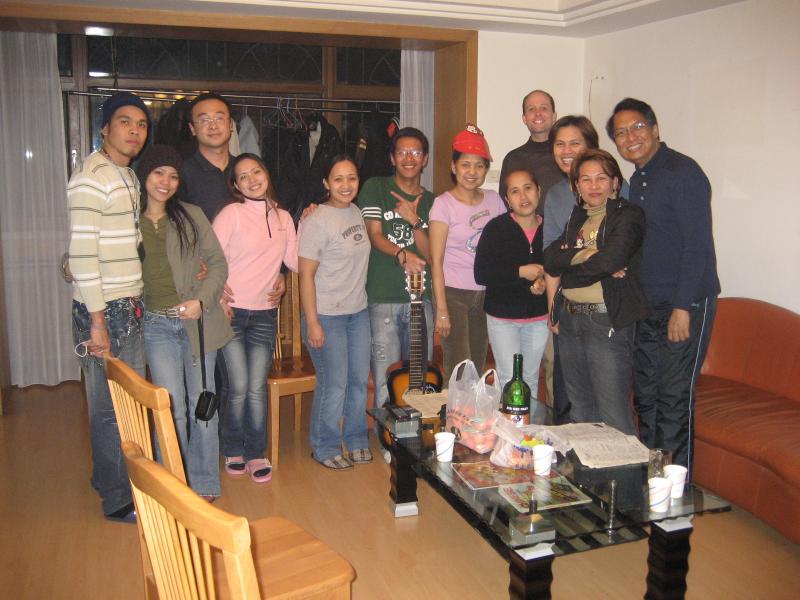May-Jun 2007
City Of The Thousand Minarets
By Fr David Warren SFM
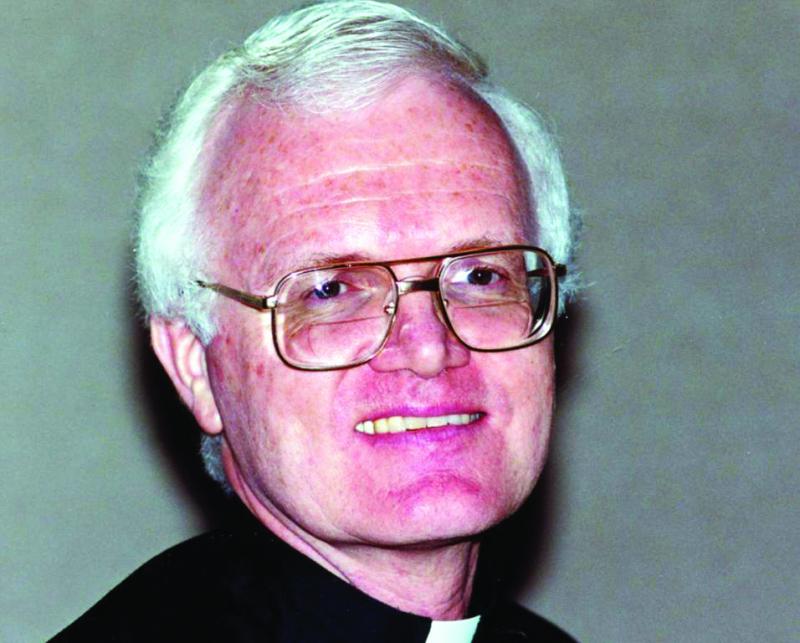 The author is a member of the Scarboro Foreign Missionary Society (www.scarboromissions.ca), founded in Canada in 1918. He worked in the Philippines for many years, in the Diocese of Maasin, Southern Leyte, and in San Carlos Major Seminary, Cebu City.
The author is a member of the Scarboro Foreign Missionary Society (www.scarboromissions.ca), founded in Canada in 1918. He worked in the Philippines for many years, in the Diocese of Maasin, Southern Leyte, and in San Carlos Major Seminary, Cebu City.
I didn’t need an alarm clock in Cairo. Before sunrise each morning, I was awakened by the call to prayer as it sounded forth from the minaret or tower of the nearby mosque. Allah Akbar! (God is Great!) it would begin. In fact, five times each day the call to prayer would sound forth.
In 2001 I began to learn about Islam. I read books about Islam and I met individual Muslims – including and especially the kind Muslim gentleman who tutored me for a year in the language of the Muslim holy book, the Qur’an. But I wanted to experience life in a Muslim country.
The opportunity came to me through Father Douglas May, a Maryknoll priest from the United States who lives and works in Egypt. Each year Father May runs a course in the English language for the students of the Catholic Coptic Seminary in Cairo. He recruits native English speakers from North America to work with him. I applied and was accepted as one of the teachers for this year’s course. From June 12 until July 12 I lived in Cairo.
I felt some fear about going to Egypt. I was aware of the recent bombing at Sharm el-Sheik and the increasing power of the Muslim Brother-hood. But, once I arrived in Egypt, my fears were quickly dispelled. I found the Egyptians to be a friendly people. I also found them to be quite solicitous towards foreigners like myself. On the subway they would invite me to take an empty seat. Once when I was looking for a street in downtown Cairo, a young man who saw me looking around stopped to help me.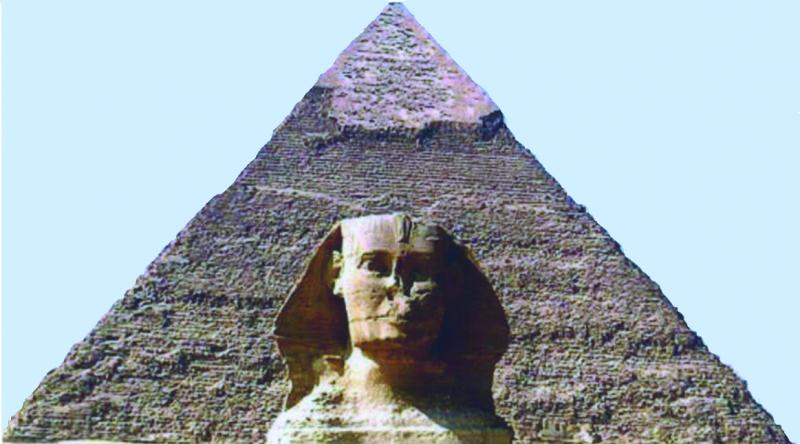
I went to Egypt because I wanted to experience life in a Muslim country. Officially, Egypt is not an Islamic state. But ninety per cent of Egypt’s seventy-two million people are Muslim. In the West, religion tends to be a private affair. In Egypt religion is very public. I have already referred to the call to prayer which sounds forth from the mosques five times a day. But on the subway I would see a good number of men reading the Qur’an. In the late afternoons I would go for a walk and I would see men with their prayer beads. I would pass a security guard who would be chanting the Qur’an all by himself.
The Islamic character of Egypt is apparent from the way women dress. Almost all Muslim women wear long dresses and the hijab (veil). A few even wear the burqu’ which covers everything except the eyes. The first two cars on the subway are for women only. (I’m glad someone told me that before I got onto the wrong car!) The Islamic character of Egypt is also apparent in the relative absence of alcohol. There are shops which are licensed to sell alcoholic beverages, but few eating places serve alcohol. Islam also prohibits the eating of pork. Sausages in Egypt are made from beef and not pork.
My most memorable experience in Egypt occurred one evening in El-Azhar Park which overlooks the city of Cairo. The sun had just set in the west and the evening call to prayer began to rise from every minaret in Cairo. Allah Akbar! The call to prayer blotted out every other sound in the city. At that moment I understood why Cairo is called the ‘City of the Thousand Minarets’. At that moment I also felt the enduring power of Islam and the need to know it better.
You may write Father Warren at: Scarboro Missions, 2685 Kingston Rd, SCARBOROUGH, ON, CANADA M1M 1M4
or email him at dwarren@scarboromissions.ca
Father Joeker

By Fr Joseph Panabang SVD
‘STAT’ STRUCK
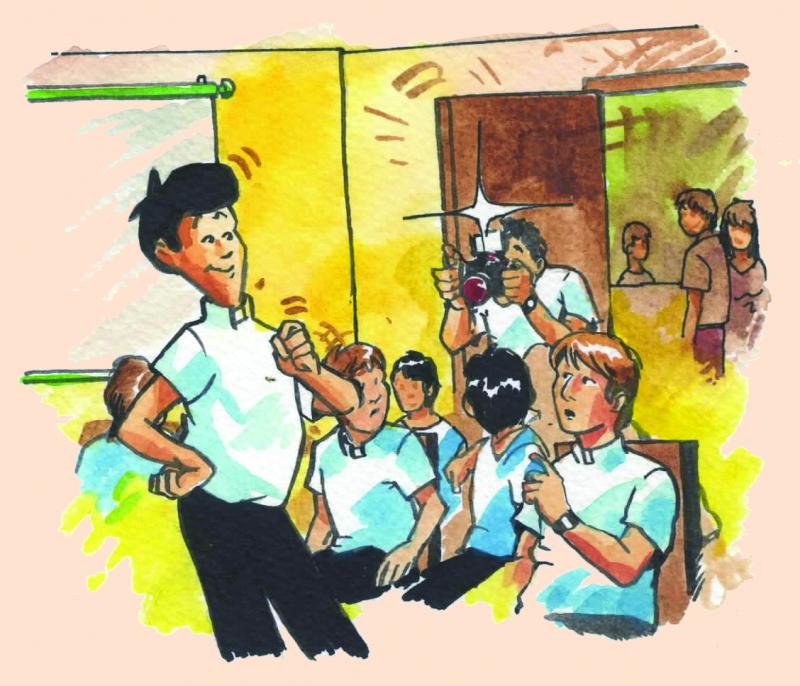
During our Renewal Course in Steyl, Holland, our group was to report last. ‘That’s good,’ I thought, ‘since many things would have been reported already. I’ll just shorten my report.’ ‘You must report all the details even if they have been reported already,’ said Fr Peter McHugh SVD, our professor, who at once read my intentions. Luckily, while I was reporting, photographers of Steyl Mission Magazine, Stat Gottes, barged in to take pictures of our class, distracting my audience. Saved by the bell!
COMMON GROUND
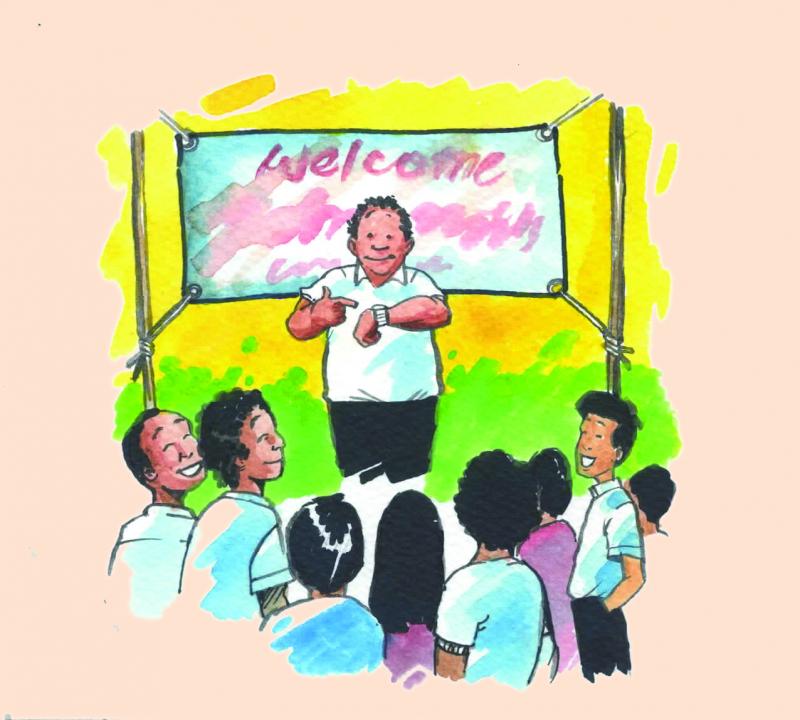
When the Philippine Consulate opened in Ghana in February 2001 the ceremony began an hour late. In his welcoming remarks, Mr Alex Quarmyne, a Ghanaian married to a Filipina and the first Honorary Consul, said, ‘Ghana and the Philippines have many similarities – one of which is time. The Philippines has “Filipino time”, just like our “Ghana time”’.
EAGER DEFENDER
Back in our house in Accra, I was asked why I was delayed coming back from my vacation. I was about to answer when suddenly Fr Thomas D’ Mello SVD from India sprang to my defense, ‘Because Father Joe easily forgets and at times he doesn’t remember’, he said amidst the group’s laughter.
MISNOMER
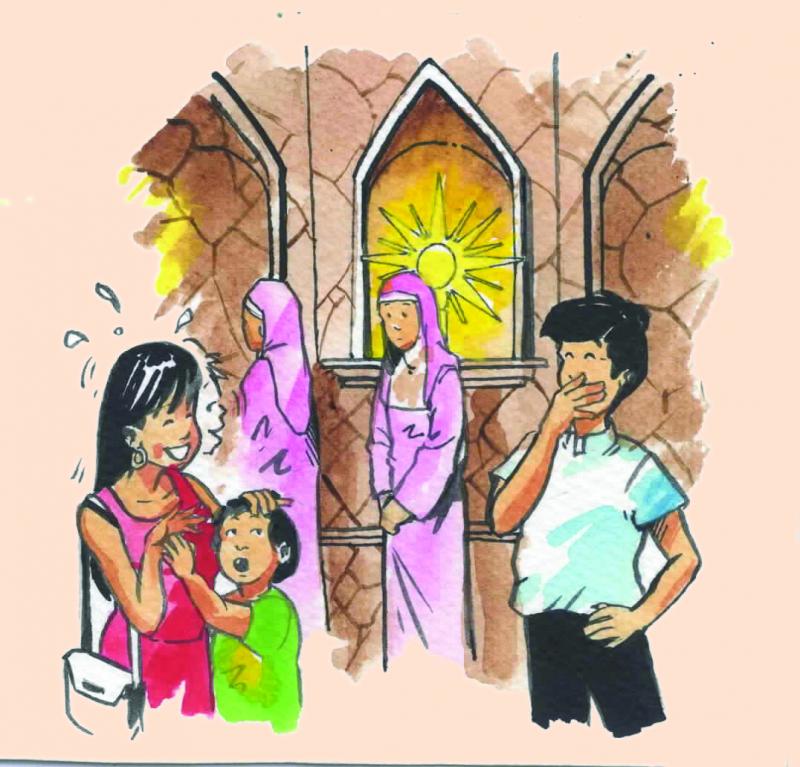
I shared this story with the Pink Sisters in New Washington, Aklan, one Holy Week. A mother and her son visited a convent where they found the Sisters at their Holy Hour in front of the Blessed Sacrament, encased in a monstrance. Curious, the son asked the mother about the monstrance and received a good explanation from her. A week later, during her home visits, one of the Sisters saw the boy running excitedly to his mother saying, to his mother’s embarrassment, ‘Mama! Mama! She’s here! She looks like the monstrance!’ Bowing low in apology, the mother explained, ‘Sister, he means, your face radiates the Lord. As the monstrance carries the Lord so does your face reflect Him,’ an explanation that delighted the visitor. A ‘monstrous’ escape indeed!
Finding My Home
Dearest Father Seán and staff,
Prayerful greetings in the name of our Lord Jesus! I was inspired to write after reading three issues of MISYON which my aunt lent me.
I had already become interested in obtaining a copy of your magazine after reading some stories from it in the Sunday Examiner. So it was a great blessing to have it through my aunt. I considered it as God’s manifestation of His unconditional love for me. All the contents nourish my soul. All the life stories of our dear missionaries are very inspiring and challenging. When I read the January-February 2006 issue only last May due to numerous borrowers, I was really struck by the life shared by Melissa Andrea M. Kayahon when she said, ‘I have learned the deeper meaning of happiness and fulfillment – that this can be achieved not by seeking fun and pleasure alone but by giving one’s self, including your time, talent and resources to make others happy’. This is really true for us migrant workers, especially my fellow workers who commit themselves to volunteer in religious organizations during our holidays.
I arrived here in Hong Kong on 21 March 2001 and have never been home for any vacation. It’s a great struggle on my part being away from loved ones especially from my boyfriend who patiently awaits me. Nevertheless, what makes me overcome my homesickness is my intimate relationship with God. During my first day off, my cousin brought me to the El Shaddai’s Fellowship. It was so wonderful. It made my spirit come alive and it gladdened my sorrowing heart. Later, I got involved in the Saturday choir at a Filipino Mass with the help of a friend. Finally, when I changed employment, my day off was Sunday, so I voluntarily joined one of the Church organizations at St Joseph. I asked about their particular apostolate, wanting to be involved in it. Through God’s grace, I joined the Legion of Mary.
Being in the Legion was one of the great achievements in my life because through my involvement, my devotion to our Blessed Virgin Mary deepened. In our parish in the Philippines, there was no Legion of Mary or any Marian Movement or established organization. It’s only during the month of October and May and during a novena for the dead that we pray the Holy Rosary. Here, I listened to the messages of Mama Mary and her role in our Redemption. I therefore promised to pray the Rosary everyday. Doing so is very enriching for my spiritual life.
In the Legion, we have several kinds of apostolate such as working at a home for the aged, a hospital and an orphanage, propagating the praying of the Rosary, evangelizing prisoners and encouraging people to come to Mass in the parish. Due to our obedience and commitment as soldiers of Mama Mary, everything was done smoothly with love. I came to realize that this is the continuation of my mission as a catechist in the Philippines, although in other kinds of apostolate.
Despite our heavy duties as domestic workers and instead of having our rest or being with our friends somewhere else during our day off, we feel at peace and energetic doing our Legionary apostolate. We have to have courage, for there are always ‘temptations’ around us, especially the invitations of friends who don’t like to be part of the group. Sometimes I say ‘yes’ to their invitation to join in volleyball games, depending upon the availability of my time.
Indeed, I realized that doing the will of the Father needs self-denial and there’s always inner peace and real contentment and assurance, as the message last Easter said, ‘There is fullness of life after our earthly life’s journey’.
I’m very much grateful to all the MISYON staff for this grace-filled magazine and to all those who contribute their life stories, which strengthen, inspire and comfort us who are far from home, nourishing our spiritual life and relieving our emotional pain. One thing is for sure, it reminds each and everyone that as baptized Christians, we share in the kingly, prophetic and priestly mission of Jesus. It calls us to be aware of His message and the way we respond to it. In fact, through this wonderful magazine, I felt God’s presence as I began to read so I didn’t stop till I was finally finished. I slept at 2am but it was a very restful and peaceful sleep.
A million thanks to all of you for your untiring efforts in editing my article. I really try to sharpen my mind by reading, which has become one of my habits because our situation here is mostly focused on our household duties. May God bless and reward you.
Sister in Christ and Mary,
Josephine ‘Jhoesie’ Lumbiyan
Leaves
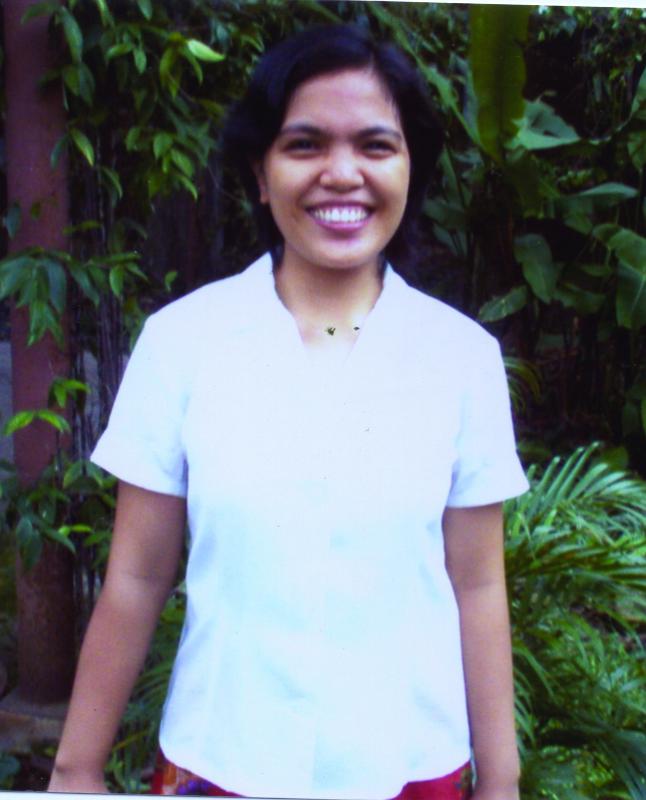
By Venus C. Vega
The author is a pre-novice with the Columban Sisters
(www.columbansisters.org)
This reflection started with a very simple question, ‘What do you do in your place of ministry?’ ‘I clean leaves by the sackful’, I said. My workplace is in Marikina, about an hour’s ride from where I live. The Tuason Community Center Foundation, Inc is dedicated to empowering women and so most of the workers there are women who are considered poor and marginalized. Except for the few who do administrative work, the rest are non-professionals.
Cleaning leaves by the sackful
Once a week I go to work in the Center as part of my pre-novitiate formation program. One section in the Center is dedicated to the production of herbal medicine. This is where I was assigned. The first time I entered the room where I was to work, I saw nothing but sacks and sacks of dried leaves. My task was to clean the leaves – one by one. The more leaves I clean, the more capsules the workers can produce, and the more money they bring home to their families. My companions are fast workers; they produce as many as 1,000 capsules a day. Naturally, I was nervous the first few days at the Center. I was very slow in cleaning the leaves. I was very cautious. I was fingering each leaf carefully, afraid I might tear it up, as the leaves were very brittle. At the end of each day I felt very, very tired.
I belong
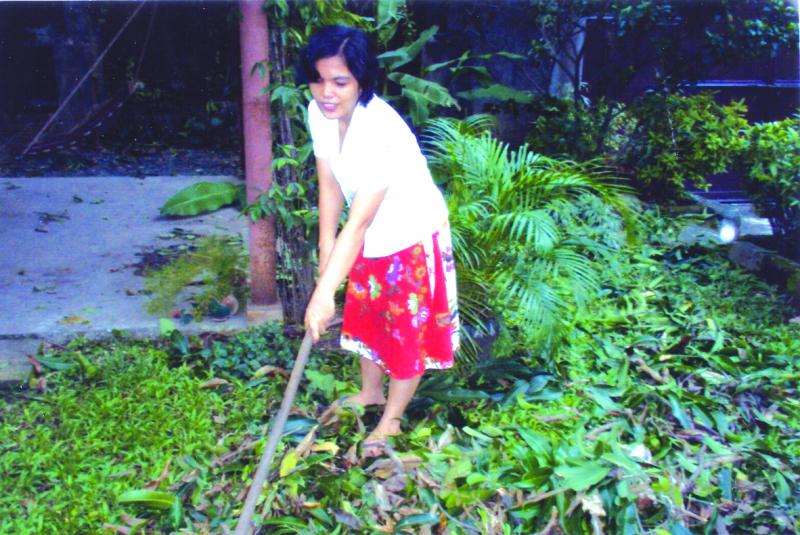
The author at work amidst leaves
The succeeding weeks things improved. I became more relaxed with the group. Little by little I got to know them by name, their husbands’ names and where they worked, how many children they had, where they went to school and so on. Needless to say, the more I talked with them the more I felt accepted and welcomed. My worries and fears on how to get to Marikina subsided. Looking back, I think what helped me to be more relaxed was the way we worked together. While we were busy cleaning, cutting and pulverizing the dried leaves we were chatting, laughing and listening to each other’s stories. During mealtime, we ate together and the story-telling continued with more laughter.
What’s in a leaf
As the weeks turned into months, I got to be more and more interested in what I was doing in the Center. I became more open in relating to everybody, from the administrators to the workers, women and men. By then I knew each one by name – why, even leaves had names! I realized that I was drying sambung and ampalaya leaves all this time. Before, the leaves were just leaves to me and I wasn’t interested in finding out their names. And as I hold in my hand each dry leaf, I realize how precious it is because it gives life to the people. The leaves I hold now are turned into medicinal capsules that heal the physical aches and pains of the sick. I also realized that these dry leaves are putting food on the table of many families and are sending many children to school.
Nurtured spirit
The workers at the Center are simple people with no high education, and yet they are happy. They have learned to love not only their work but most of all to love one another. The work in the center is tedious but the spirit of the people there is bubbling with life, joy and hope. They have endlessly challenged me to be more loving and understanding in all my relationships, to grow more deeply in God’s love and to nurture a spirit of life, joy and hope in my own community. I am reminded of a prayer by Joyce Rupp and by way of ending this reflection on dry leaves I would like to share it with you:
We move so fast, God, and sometimes we see so little in our daily travels. Slow us down. Create in us a desire to pause. Help us to pursue moments of contemplation. Help us to see in a deeper way, to become more aware of what speaks to us, of beauty and truth.
Our inner eye gets misty, clouded over, dulled, we need to see in a new way, to dust off our heart, to perceive what is truly of value and to find a deeper meaning in our lives.
All of our ordinary moments are means of entering into a more significant relationship with you, God.
In the midst of those very common happenings, you are ready to speak your word of love to us, if only we will recognize your presence.
Teach us how to enjoy being. Encourage us to be present to the gifts that are ours. May we be more fully aware of what we see, taste, touch, hear and smell. May this awareness of our senses sharpen our perception of our everyday treasures and lead us to greater joy and gratitude.
Grant us the courage to be our true selves. Help us to let go of being overly concerned about what others think of us or how successful we are. May our inner freedom be strengthened and our delight in life be activated.
Life is meant to be celebrated, enjoyed, delighted in and embraced in all its mystery. Guide us to our inner child. Draw us to your playground of creation, God of life, so that we will live more fully. Amen.
You may write the author at:
Columban Sisters, 44 A Rosario Drive, Cubao, 1111 QUEZON CITY
My First Fiat To God's Call
By Jude M. Garceniego
The author is now studying in St Joseph Regional Seminary, Jaro. His sister Cherryl is a novice with the Capuchin Tertiary Sisters of the Holy Family in Talisay City, Negros Occidental. It was during a high school retreat in Sacred Heart Formation Center, Bacolod, that I made my first ‘fiat’ to God in His calling me to priestly formation.
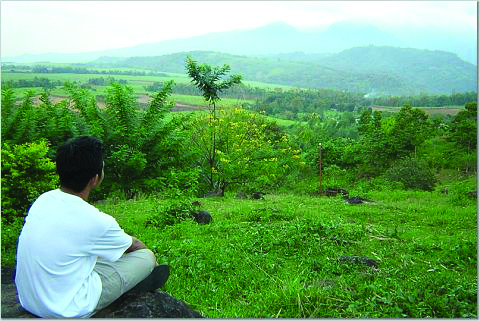
Our adviser, Ms Alicia Calexterio, now Mrs Alicia Dalanangbayan, the faculty and staff of Our Lady of Lourdes High School, Candoni, Negros Occidental, decided to have the retreat of the graduating class on 6-7 December 2000, with our outing the following day.
A life-defining experience
We left Candoni at 6:30am, 49 students on a bus the school rented for the three days. We were being accompanied by Ma’am Lionela Soriano, our Principal, and our teachers Mr Edwin Vallagomesa, our Math and PEHM teacher, Mr Ronelo Medel, our Filipino teacher, Ms Alicia Calexterio, our Adviser, Mrs Helen Florendo, our Speech teacher, and Sr Ma. Olive ‘Daday’ Elisan OSA as our retreat director.
We arrived at Sacred Heart Formation Center around 10:30am. The retreat began after we’d arranged our baggage and prepared ourselves to encounter God in the midst of our past and present life.
A moment to cherish
Many things happened during that memorable and cherished moment of my high school life – my first retreat. That was my very first time to have an encounter with God through my very self as a person, as a student, and most especially as a Christian. Having gone through all the activities in the retreat, I felt different, with an unusual kind of feeling that I never had in the past. It was as if I was walking on air, with the lightest feeling imaginable. This lasted even until we were on our way to Mambucal, Murcia, a mountain resort, for our outing. I shared my feeling with my classmates and asked them if they felt and experienced the same.
A few among us
For our concluding rite in the retreat, we had Mass with an Augustinian Priest, a friend of Sister ‘Daday’. After Mass, she congratulated us on the success of our retreat. She also asked if there were any among us who wanted to become a priest or religious. Without any hesitation or doubts, I raised my hand and answered, ‘I am’. All my classmates turned their heads and looked at me sitting at the back. Maybe they were wondering why I was able to decide for that vocation – to become a priest.
Yes, I also had a little fear and worry with my decision after that, but I just thought to myself that it was not yet final. And besides me, two of my classmates raised their hands to show they were interested in becoming religious.
God’s hand
This event has marked my life to the present. This was my first ‘fiat’, my ‘yes’ to my unknown vocation at first, because when I raised my hand I was uncertain what priestly formation was and what the priestly vocation is all about. It happened on an overnight retreat, my first encounter with my God and myself. The date 7 December 2000 was a mysterious day for me, when God intervened in my life. This was the first touch of God’s hand in my answering His call to serve His people for His sake and His glorification. God used that memorable day as a day of revelation, annunciation and conversion in my life, as with others whom He called.
Living out my call
The retreat was over but the fruit is still fresh here in my heart, the fruit of God’s grace and intervention in my life – to become who I am now in answering his call by loving and living my seminary life faithfully. That time, day, year and those people who were present at my first ‘fiat’ to God’s call became a big part of my present life as a seminarian and in the future, if it is God’s will, as a good and holy priest.
Handmaid of the Lord
As the Blessed Virgin Mary said, ‘Behold, I am the Handmaid of the Lord. May it be done to me according to your word’. I too, under the guidance of the Blessed Virgin Mary, of St Jude, my patron, and of my Guardian Angel Thaddeus, said, ‘I am your unworthy and poor servant Lord, here I am to follow Your Will’.
You may email the author at jude_g7@yahoo.com.ph
or write him at St Joseph Regional Seminary,
St Joseph Village, Brgy Cubay Jaro, 5000 ILOILO CITY
My Gratitude To Columban Missionaries
By Dalisay Barrera Sena Yu
The author expresses her gratitude to Columban missionaries in Olongapo City and shares some of her experiences in Zambia, where she and her husband worked. She now works in Japan and has children in Australia and the Cayman Islands. Last year she became the proud grandmother of twin boys.

I am pleased to read your magazine as it reminds me of my happy days in Columban College, Olongapo City, where I finished my high school and college education. I was a Catechist under the Columban Fathers and an active Student Catholic Action (SCA) Cell leader when Columban Sister Una was our Spiritual adviser. One semester she recommended me for a scholarship when I wouldn’t have been able otherwise to continue my education because my big sister was graduating from the University of the East. My father couldn’t afford to send both of us to college at the same time. Sister Una encouraged me to continue my studies and I was granted the scholarship because I was active in SCA and a Catechist. My Dad and Mom were so grateful to the Columban Fathers and Sisters that time.
Future plans
When I was in high school my confessor was Father Thomas Convery, I hope he still remembers me. I want to thank him for all his prayers. I recall the time he said to me, ‘You still have to prepare for your education. What are your plans? I hope you won’t marry at once, you are still young’. I answered, ‘Father, you’ll be seeing me for more than four years because I’ll complete my education here. For sure I will be given the chance to teach here after graduation’. I enjoyed my life both in high school and college.
I had my first and second year teaching experience at Columban College. When I got married, I was accepted to teach at a government school in Marinduque. After a while I was hired to handle the second grade at Marcopper Expatriate School. The following year I was transferred to teach at the school on which the Marcopper employees depended: Marcopper Elementary School. My husband worked as a metallurgist at Marcopper Mining Corporation. He was one of the lucky employees given the chance to work in Zambia, in southern Africa. He was hired as metallurgical engineer in Nchanga Consolidated Copper Mines, the second largest copper mine in the world. I was grateful that I was accepted to teach at St John Convent School, Chingalola, the town in Zambia where we lived and my husband worked.
I was appointed to teach Grade IV in an internationally mixed class. Seventy percent were Zambians. The rest were Malaysians, Filipinos, Indians and British. I didn’t have any difficulty handling them because Zambians are polite and they love to learn. In addition, I had previous experience at Marcopper. We lived in Zambia for fifteen years and I enjoyed teaching there. It’s an English-influenced county. It has a very good environment, with no pollution in spite of the fact that we lived near the copper mine. The British are so particular about pollution, so aware. Zambia attained independence from Britain in 1964.
Our lot, which had been cultivated by the British before independence, consisted of 1,000 square meters while our house floor area was 400 square meters. It was so nice, with fruit-bearing trees such as mangoes, avocadoes, peaches and so on planted by the British. The houses were made of bricks. The drainage surrounding all the copper-mine towns in Zambia was deep and wide. The climate is so good, with three seasons. April to August is cool and dry, August to November hot and dry, and November to April warm and wet. There was no dust around even in summer. Many British stayed after they finished their contract in Zambia and turned to farming. Owning large tracts of land, they became wealthy.
Life in Zambia

Daisy’s youngest child’s 2nd birthday party with Zambian neighbor
Zambians are hospitable. They like us because we are so competent, reliable, loving and hospitable. I could speak their language with my own children, who grew up there. We enjoyed our stay in that country. They were the most remarkable years of my life. I miss my pupils at Sacred Heart of St John Convent School. Sister Crucifix was principal then.
Now that my children are independent, having their own professions, I’m thinking of giving my time to God at the fullest. How many times I thank the Lord for giving me a farm with a life-size grotto made of marble. Every time I’m in front of it, I can feel His presence. I want to share this place with others. I’m dreaming of putting up a chapel and an all-purpose building there. I have a bungalow with two bedrooms there. I have a vision that I could make a difference for the Lord in that place. It’s still but a dream.
I dream of giving my time and place to those who are seeking a solemn area where they could talk to and feel the presence of the Lord. I want to offer my place, so quiet, just like Mt Zion, almost half a hectare along a road in Rizal Province, an hour’s ride from Marikina, where the beauty of nature is all around and the mountains echo; with views, birds, trees and everything that the Lord gives equally to all who know and love Him so dearly. I love this place, I real gift to me that I want to share with those who are in soul-searching, just like me before. Now I’ve found Him in this beautiful gift!
In gratitude

Daisy,in her paradise
My children also have plans to help me with my dream but they are still starting with their own lives. How I wish I can continue by vocation, my dream to be a gift to others through these little things that I’m doing, making me feel I’m with him. I’m so happy dreaming – thinking of these things. My husband and I want to share these gifts that God has given have us.
My gratitude to the Columban Fathers and Sisters for all these blessings is deep. I owe what I am now to them.
You may write to: Mrs Dalisay Sena Yu, 7-2-1-3-107, Koyo-Cho-Naka
Higashinada-Ku, KOBE 658-0032, JAPAN
On The Road To Conversion
By Sister Marivic P. Ching SGBP
Sister Marivic is a member of the Sisters of Jesus Good Shepherd, known as the Pastorelle Sisters. This is one of five congregations founded by Blessed James Alberione (1884-1971) www.daughtersofstpaul.com/jamesalberione/index.html . The congregation’s website, which has an English version, is www.pastorelle.org
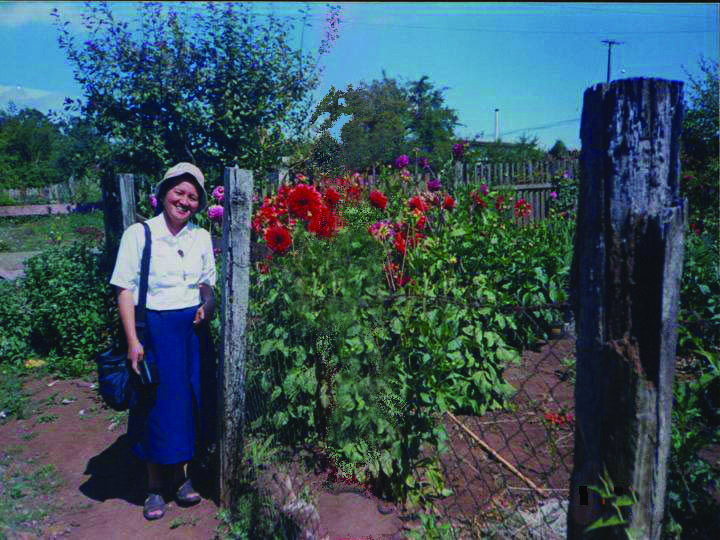
I Chose you’: the words which best expressed my sentiments after struggling with God in my prayers in this new mission. When Sister Marita, Provincial Superior, told me to go to a mission in Chile, I had mixed emotions that were hard to articulate. To be the first Filipina Pastorella in Latin America, and particularly in Chile, in a community composed of Sisters from Italy, Brazil and Peru, was for me quite a challenge. With the grace of God, I agreed to be a member of the Chile-Peru Delegation. I remembered Abraham in his old age, called by God to go to a nation that he had never known or seen before, and, like him, I obeyed.
Enriching community
‘It’s good to be here’ . . . words that best describe my experiences here in Chile. I feel enriched by the beauty of the internationality of our congregation. Although we have different cultures and languages, we are learning from one another. We share much in our diversity, which makes community life dynamic and enriching. Chileans are very friendly and welcoming. Our parish priest, Padre Alfredo Pouilly, introduced me to the parish community after a Sunday Mass.
Into the deep
I felt welcomed and challenged to share with them our pastoral ministry. Everyday I am called ‘to put out into the deep’ like Peter ‘because you say so’. I obey. I believe that the harvest is bountiful. Although I miss the Philippines, the Sisters and my family very much, I am happy to be here. There are many things to learn and to experience.
Happy to be called
‘The Lord is my Shepherd.’ Truly He calls and journeys with me in this beautiful opportunity. I am grateful to be a missionary, to be called to journey on the road to conversion, not to fear the truth and always to live with simplicity. The Father has called me and entrusted me with this mission, and I want to carry on.
I remembered Abraham
in his old age, called by God
to go to a nation
that he had never known
or seen before,
and, like him, I obeyed.
You may email Sister Marivic at maviching_1206@yahoo.com or write her at SGBP Casilla 17/78 Correo Bellavista, La Florida, SANTIAGO, CHILE
Our Hideaway

A venue for the youth to express themselves and to share with our readers their mind, their heart and their soul. We are inviting you – students and young professionals – to drop by Our Hideaway and let us know how you are doing.
I am because of her
By Jomar B. dela Cruz
On 6 June 1987, at around one o’clock in the morning, my tender-hearted mother gave birth to a very healthy little boy. I had an angelic, candid face and a lovely, soft voice. My parents truly believed that my birth was a wonderful blessing for them. With their names they named me, Jomar. They made me the heir of both their beautiful names, ‘Jo’ from my mother’s name, Jocelyn, and ‘Mar’ from my father’s name, Mario.
I grew up in an atmosphere of love. My parents unhesitatingly gave me everything I wanted. When I cried, they would panic! They loved me very much! Perhaps, I experienced the greatest love of all.
However, seven years after my birth, misfortune came. My father suddenly died of a heart attack. My compassionate mother was left to love and care for me. My mother was everything to me. She taught me everything that could make me a good boy and could lead me to become a better one in the future. Above all, she taught me how to love, respect and fear God.
The years passed and I reached adolescence. I noticed so many things changing in my body. My mind grew mature, my voice became strong. I fell in love. I experienced the happiest stage of my life as a teenager. Sad to say, it was also the worst time in my life. I began to disobey and rebuke my mother and disregard all the teachings, discipline and good values that she had imparted to me. Despite my wickedness, she still continued hoping and dreaming that someday, through her unceasing prayers, her child would be enlightened.
Fortunately, the dreams and prayers of my mother were heard by God. I realized the bad things I did and did penance for them. I returned and lived again in the happy comfort and confidence of my mother. This change began when I first saw a humble old man in his seventies, wearing a simple white garb, walking with dignity in the midst of a throng. This elderly man eloquently spoke to the crowd and everybody carefully and respectfully listened to him. I wanted to be like him. This man was the late Pope John Paul II.
After I graduated from high school, with the inspiration and encouragement of my mother, I decided to enter the seminary, to be a priest. Now, I am facing my fourth year of formation here in St Vincent de Paul College Seminary, walking in this perilous and mysterious journey to priesthood. I am beginning to realize the real love of the One who really loves me. I learned to pray, to trust in God, to love and to serve Him as I continue answering His call. I give thanks to God for giving me my mother as His instrument in showing me how to enjoy the gift of life. My mother is my inspiration as I continue to answer my vocation.
You may write the author at: St Vincent de Paul College Seminary,
Dagum Hills, CALBAYOG CITY, 6710 Western Samar
Send us your story (500 to 1,000 words) to PO Box 588, 6100 Bacolod City
or email it to us at editor@misyononline.com Don’t forget your picture. It makes the difference.
Prayers From The Heart
By Sister M. Rose Agnes MC
Sr M Rose Agnes considers Misyon as a source of joy and inspiration for her and for others who are working in the different nooks and corners of Sri Lanka. Whenever she finishes with her copy, she gives it to others who pass it on in turn.
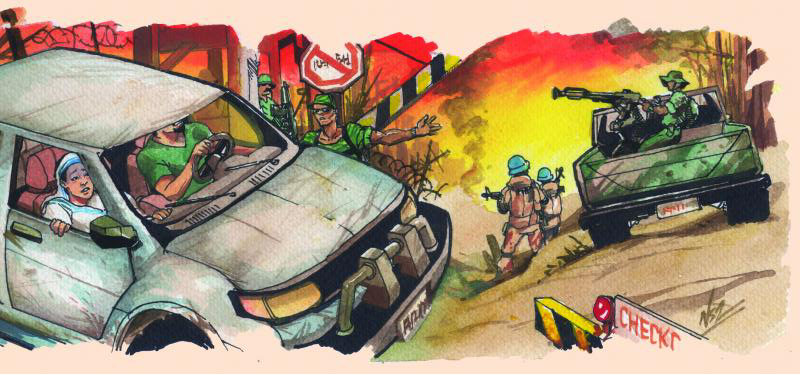
Sri Lanka is known for its exotic natural beauty, but due to the ongoing war it is sad that little by little this is disappearing. Though the government and the rebel Liberation Tigers of Tamil Eeelam (LTTE), usually called the ‘Tamil Tigers’, declared a ceasefire in 2001, killing by both sides is still ‘quietly’ going on. Now in some parts of the country it has reached a climax. As I travel from one house to another in our region, I experience uncertainty about the future. I have to surrender and be ready to die anywhere at anytime. Bombs explode anywhere but I believe that once you surrender yourself totally to Him, He takes care of all the rest, providing a protecting angel to watch over us.
Crossing the line
Once I went to a house that was in the territory between the Sri Lankan army and the Tigers. We had to go through many checkpoints. To face all this I had to learn the basics of Sinhala, the official language of the country. About 74 percent of the population is ethnically Sinhalese. I also had to learn some Tamil, the language of the largest minority, the Tamils, who make up 18 percent of the more than 19 million who live in the country. Both languages are needed to be able to get around and to make traveling, which is never too smooth, a little easier.
Brush of an angel’s wing
On the way I could hear the bombings on both sides. Because of the checkpoints, we were put in the middle of seven trucks which were carrying high explosives and weapons. Our driver started to get frightened and tried to come out of the line but was unable to. Then suddenly, the vehicle of the parish priest appeared with the other priests inside. He signaled to us to go ahead of them. So they followed us and we discovered that we were following a United Nations’ vehicle. The priests’ car never left us until we reached a safe area. I can still remember the horrible scene of that night. Early the following morning, we received the news that the seven trucks had been set on fire by the rebels.
Terror of Sri Lanka
This is the kind of thing I’ve experienced many times since arriving in Sri Lanka. You feel the house shaking and see the shells going over like balls of fire. As I watch I utter prayers from the heart hoping that it wouldn’t fall on the innocent.
War continues
Representatives of the Government and the Tamil Tigers went to Geneva for peace talks in 2005. But nothing happened and the war continues. I hope that the Philippines, where there’s a similar problem, will learn from the experience of Sri Lanka.
Please pray for us all.
You may write Sister M. Rose Agnes MC at:
Missionaries of Charity, ‘SHANTHI NIVASA’,
81 St John’s Way, COLOMBO 15, SRI LANKA
St Thomas More Patron Of Statesmen And Politicians
By Bishop Martin Drennan
A few events that took place towards the end of the Jubilee Year (2000) make it clearer what the Pope really wants us to pray for in August 2001. In a letter on 31 October 2000, John Paul II proclaimed Saint Thomas More as the patron saint of statesmen and politicians.
In the course of a homily at a Jubilee Year Mass for members of parliaments and governments on 5 November 2000, the Pope said: ‘At the beginning of the new century and new millennium, those responsible for public life are being faced with demanding responsibilities. It is precisely with this in mind that I have wished to offer you the support of a special patron, the martyr Saint Thomas More.
‘Thomas More’s life is truly an example for you who are called to serve humanity and society in the civic and political sphere. The eloquent testimony which he bore is as timely as ever at a historical moment which presents crucial challenges to everyone involved in governing.
‘As a statesman he always placed himself at the service of the person, especially the weak and the poor. Honor and wealth had no sway over him, guided as he was by an outstanding sense of fairness. Above all, he never compromised his conscience, even to the point of making the supreme sacrifice so as not to disregard its voice. Invoke him, follow him, imitate him! His intercession will not fail – even in the most difficult situations – to bring you strength, good-naturedness, patience and perseverance.’
Noble Calling
Pope John Paul II strongly affirms the noble calling of Christians to serve in the sphere of politics and lawmaking and goes on to say that for a faithful living out of their calling as public servants Christians need to be clear about their convictions if they are to have the courage to live by them.
Thomas More is a model of someone who based his choices on Christian principles. One of his best known statements is: ‘When a statesman forsakes his own private conscience for the sake of his public duty he, leads his country by a short road to chaos.’ This is the wisdom of a man who knew how to put loyalty to God in first place. This is the conviction of a man who was a servant of his people but God’s servant first. For Thomas had the wisdom to understand that if our relationship with God is distorted then our relationship with people can’t be right. He knew that if a nation is to have good laws those laws begin from respect for the law of God.
On this point, Pope John Paul II says, ‘A law that does not respect the right to life from conception to the natural death of every human being, whatever his or her condition – healthy or ill, still in the embryonic stage, elderly or close to death – is not a law in harmony with the divine plan. Christian legislators may neither contribute to the formulation of such a law nor may they approve it in parliamentary assembly.’
Respect for life
This offers a clear guideline for lawgivers as they respond to new scientific discoveries in the areas of biology and genetics.
Consequently, legislators have to remember that human life is a gift of God to be respected, never an object to be exploited for the sake of short-term needs.
Jubilee day
A second event from the Jubilee Year is significant for helping us to understand what the Pope invites us to do in our prayers of intercession. On November 4, 2000, a Jubilee Day for Members of Parliament and Government Leaders, the Holy Father recalled a statement of Pope Paul VI in which he stressed that ‘politics is a demanding way of living the Christian commitment to serve others’.
He went on to call on Christians who are engaged in politics to act selflessly, to work for the good of one and all, especially for the less fortunate members of society.
Justice
As part of that appeal he invited leaders to make some gesture of clemency to prisoners during the Jubilee Year, one that would encourage them on the path of conversion and give them an incentive to sincerely accept the values of justice.
He went on to say that justice must be the fundamental concern of political leaders and legislators, a justice which aims at creating conditions of equal opportunity among people.
True justice builds solidarity; it fosters good relationships and it is inclusive. ‘Peace is the fruit of justice,’ he says. The justice which brings peace serves to oppose all violence against human life at every stage of its development. In working for justice the tasks of politics and lawmaking are to formulate and approve laws that promote the real good of every person.
To fulfill their responsibilities to God, the sole master of human life, legislators need wisdom.
Prudence
In a pluralistic society Christian lawmakers are sometimes faced with requests for legislation that run contrary to the dictates of their own conscience.
New scientific discoveries in the fields of genetics and biology are posing complex problems for them. Lawmakers need Christian prudence to enable them to be faithful to the demands of their correctly formed conscience and at the same time to carry out their duties as legislators. They are called on to witness to their own faith and to be faithful to their own principles in every new situation which they face.
If our legislators are to make the Gospel of Christ their guide and be effective as a leaven in society they need our support and our prayer.
The Holy Father is asking us to intercede for them so that, guided by the wisdom that God is master of all of life, their work may be fruitful as they seek to build a just future, a future where the world will continue to be civilized more and more by love.
Thomas More (1478-1535) was an English lawyer, writer and politician. Born in London, he studied law at Oxford and entered the English Parliament in 1504. He married Jane Holt and they had four children. Like his friend Erasmus of Rotterdam, he was renowned as a humanist scholar. He coined the word ‘utopia’, the name – meaning ‘no place’ – given to an ideal imaginary island whose political system he described in a book of that title in 1516. When Henry VIII became king, he sought Thomas as his advisor and became Chancellor of England in 1529. In 1530 he refused to sign a letter asking the Pope to annul Henry’s marriage to Catherine of Arragon and resigned in 1532. He now had neither job nor income, but both he and Bishop John Fisher of Rochester refused to acknowledge Henry as Supreme Head of the Church of England. This eventually led to their execution in 1535. Both were canonized in 1935. During the Jubilee Year 2000 Pope John Paul II declared St Thomas More patron of lawyers, statesmen and politicians. [Editor of Sacred Heart Messenger]
To Search is to Find

We do not have the answers to every question – maybe only a partial answer that could set you in the right direction. But the very asking of the question is the beginning of the answer. So why don’t you send us your questions and together we will search.
LEFT OUT
I’m a high school student and consider myself as a religious person. But I always feel left out. I suppose my classmates hate me. Nobody likes me. Sometimes in my most difficult times I even doubt that God/Christ exists especially when people produce movies such as ‘The Da Vinci Code” and everything else that weakens the Christian faith. I am very confused with these things. What should I do? What should I believe? Please help me.
You seem to be going through a difficult patch at the moment. When I read your email I was thinking about the story in the gospels, especially the version in Mark 5:21-43. That was about two people who felt left out or were left out.
The woman who had been sick for 12 years with bleeding – it was a kind of continuous menstrual bleeding – had spent all her money on doctors and had got only worse. More than that, because of the nature of her sickness she was considered ritually unclean and couldn’t take part in the religious services of the Jewish community. And by touching the cloak of Jesus she made him ritually unclean too. But he’s not concerned about that. He wants to affirm her in her faith. He assures her that it was this that made her whole again, that enabled him to use his power as God to heal her. He gave of himself to her. She went away well and fully part of the community again, assured by Jesus that God loved her.
The young girl – dalagita or, possibly, dalaga na – was born around the time the other woman had gotten sick. She too was cut off by a grave illness and by the time Jesus reached the house the people said she was dead. The people mocked Jesus when he said that the girl was only sleeping. So Jesus was prepared to be laughed at in order to bring life back to this young girl. He then took the girl by the hand and said, ‘Talitha koum’, ‘Little girl get up.’ The Tagalog and Hiligaynon versions of the Christian Community Bible translate ‘little girl’ as ‘Nene’, while the Cebuano version of the Good News Bible has Jesus call her ‘Inday’. He speaks to her in affectionate terms. Then St Mark has a beautiful touch: he tells the family, who are so ecstatically happy, to give the girl something to eat. He knew she was ravenously hungry after her grave illness. I’m certain he had a smile on his face when he reminded her family of this.
You say, ‘Nobody likes me.’ Who prepared your meals for you today? Who taught you in your classes? Who took you to school today? In other words, there are many people who make it possible for us to live each day, particularly our family, even if it’s not the ideal family. No family is. (You didn’t say anything about your family so this is just general). Did nobody say ‘Good morning’ to you today? Did nobody smile at you? Did you smile at anyone?! Were you nice in any way to someone else?
When you write, ‘I suppose my classmates hate me’, do you mean that you have feelings of hatred or anger towards them? The feeling isn’t by itself hatred. Hatred, like love, involves a decision. I can still love someone even when I’m feeling angry or negative towards that person. I can decide to still treat that person with respect.
The woman in the incident in the gospel felt all alone, maybe close to hopeless. But she had faith enough in Jesus just to touch his cloak. Jesus saw the plight of the daughter of Jairus. And it was the girl’s father who sought Jesus out of his great love for her.
You can share your experiences and feelings with Jesus in your prayer. You can ‘touch his cloak’ as you do this. You can let him take you by the hand as he says to you, ‘Nene, I love you!’ I keep quoting St Therese of Lisieux’s description of holiness: ‘becoming what God wants us to be.’ He has a loving dream for each of us and wants us to grow into that.
It’s good at the end of each day to have quiet time and review what has happened, especially the blessings. Most of these are ‘small.’ This morning, for example, I celebrated Mass with Sisters who run a home for abused girls. I didn’t have a chance to talk to the girls as they were on their way to school. But they all gave me a big wave and a smile as I passed them on the road. Yesterday I heard the girls’ confessions, celebrated Mass with them and the Sisters, and spent time chatting with them afterwards. As always, I felt a sense of joy.
Each day I spend time in prayer, usually with a passage from the Gospels, and usually in front of the Blessed Sacrament. I do this early in the morning. It’s coming to know Jesus there and finding his presence in so many others that strengthens my faith.
I haven’t read or seen The Da Vinci Code. One source where you can get some help about this is www.jesusdecoded.com , a website developed by the US Catholic bishops.
CHRISTIAN SMORGASBOARD
Why do we have different religions, eg, Roman Catholic, Baptist, Protestant, Born Again, Iglesia ni Kristo, Aglipay, etc? Maybe differences within Christianity?
From the beginning there have been differences between Christians. For example, St Paul criticizes the Christians of Corinth very strongly because the ‘haves’ discriminate against the ‘have-nots’ after the Sunday Eucharist when they bring lots of food and don’t share it with those who are poor. Paul also reminds Christians that they are not his followers or followers of Apollo – another preacher of the Gospel – but of Jesus Christ.
Down through the centuries there have been serious divisions caused by different interpretations of the Gospel. There were two major divisions, one in 1054 when the Orthodox Churches broke away from Rome. It was largely over the authority of the Pope. Each side excommunicated the other. It was only during the time of Pope Paul VI, 1963-1978, that both sides lifted their excommunications. The Catholic Church has always recognized that the bishops, priests and sacraments of the Orthodox Churches are true bishops, priests and sacraments.
In the 1500s a number of Catholics in Europe broke away from Rome and rejected some of the Church’s teachings. These included Martin Luther, John Calvin, John Knox and others. King Henry VIII of England also broke away and started the Church of England when the Pope wouldn’t annul his marriage. Most of these people called themselves ‘Protestants’ because they were protesting against certain aspects of the Catholic Church. In your question you include ‘Baptist, Protestant’. The word ‘Protestant’ covers many different Christian groups, including the various kinds of Baptists. None of these Protestant groups have anybody with the kind of authority that the Pope has in the Catholic Church.
The Iglesia ni Cristo, despite its name, isn’t a Christian body, as it denies the divinity of Christ. (You can read more at www.catholic.com/library/iglesia_ni_cristo.asp ).The belief that Jesus is God and Man is central to Catholicism, to the Orthodox Churches and to the vast majority of practicing Protestants.
In the last century, among the three main groupings of Christians, many began to pray for unity among Christians as God’s will, expressed by Jesus in his prayer at the Last Supper, ‘that all may be one’ (John 17:21).
In other words, Jesus founded only one Church. The Second Vatican Council (1962-65) made ecumenism, the search for Christian unity, central. The word ‘ecumenism’ refers to the movement towards the unity of Christians. It doesn’t include dialogue between Christians and people of other faiths such as Islam, Buddhism, Hinduism and so on. That’s a very different matter. One thing that unifies Christians is that all are baptized ‘In the name of the Father, and of the Son, and of the Holy Spirit’. This means, for example, that if a Baptist or a Methodist wishes to become a Catholic, they will be confirmed but not baptized, since the Church recognizes their baptism as valid.
The Catholic Church, which recognizes the presence of Christ in other Christian churches and bodies, especially through baptism, nevertheless has always taught that it is the one, true Church founded by Jesus Christ. Find out more in the Catechism of the Catholic Church, Nos 811-870 (www.christusrex.org/www1/CDHN/church3.html).
Touches Of God
Touches Of God
My first home visit to the Philippines
By Sister Mary Carmela OCD
Sister Mary Carmela last appeared in these pages in the September-October 2005 issue. The English version of the website of the Carmelite Monastery in Vilvoorde, Belgium, where she lives is www.dentroost.be/english/ukindex.htm

Vacation is also a mission’, was the gist of what dear Rev. Mother Ann Christi whispered to me before she gave me Holy Communion at dawn on Sunday, 21 May, reminding me of Mary Magdalene. After her encounter with the Risen Jesus early on Easter Sunday she ran to proclaim to others the Good News that indeed ‘He is alive!’ I should radiate Jesus to everyone He desired to send me.
I went to our two oldest sisters in the community, Sr Teresia and Sr Augustina, to kiss them goodbye. I attribute my perseverance in Belgium these past three years a great deal to their prayers and never failed to mention them in my letters to the Philippines. As I bade the other Sisters goodbye, I refrained from looking into their eyes for fear of crying, but didn’t fail to notice some tears.
Toto and Expie Castor, a Filipino couple, drove me to the airport. Toto is from Silay City, Negros Occidental, and Expie from Bohol. Though I have learned to love the Belgian people, the Vlaamingen, I am and will always remain a Filipina! Toto, an embassy driver, was able to use the official car because he was to meet an ambassador. We parked in the VIP area, the first of God’s many delicate touches during my journey.
Touching peace
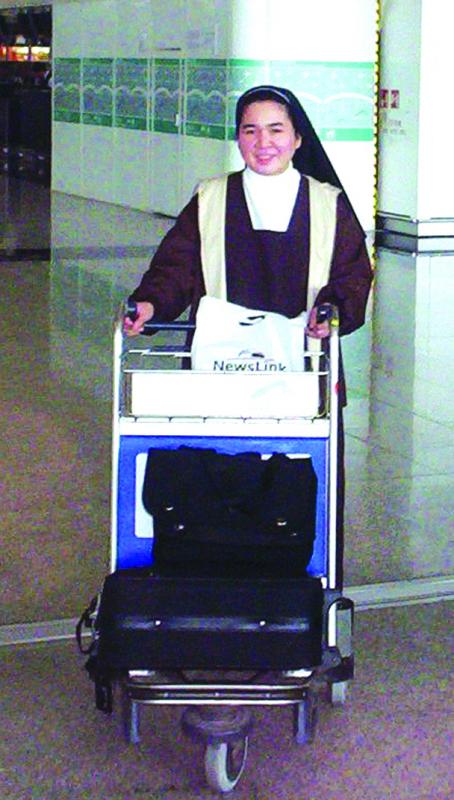
The British Airways counter was still closed and in darkness. I thought of Mary Magdalene again. A Filipina friend, Lilibeth Villareal, who works with British Airways Cargo, had earlier obtained for me an extra baggage allowance for my heavy suitcase loaded mainly with Belgian chocolates. I kissed Toto and Expie goodbye. Since our arrival in 2003, they have become like parents to us Filipino Carmelites.
I prayed Morning Prayer, and spent time in silent mental prayer until boarding time. I had asked the Sisters earlier to pray that God would give me a silent neighbor on the plane. To my delight, the entire row of six seats, except my own, was vacant. In my heart I said, ‘Those seats were reserved for Jesus, Mary and Joseph,’ my ‘travelling companions.’ I continued my silent prayer and reflected on my three years in Belgium during the hour-long flight to London.
Touches of kindness
At Heathrow Airport I searched for a chapel but found only an ‘inter-denominational prayer room’ where I saw a man on a mat kneeling and bowing to the ground and presumed he was a Muslim. In a corner in the waiting area I prayed Mid-Morning Prayer and read Pope Benedict’s encyclical, Deus Caritas Est, ‘God is Love’. Later I observed people lying down on empty seats, two guards talking loudly to each other, sick and elderly passengers being wheeled in and out of the room. Noticing some public telephones, I remembered our three Filipina Sisters on loan to our monastery in Darlington, England. I approached a tall black security guard and asked how to operate the telephone. He not only gave me a coin for the machine, but also helped me to dial. At the end of my allotted time, I told the Sister on the other end to call the two others while I looked for coins to continue the call. The guard pointed to a machine where I could exchange my euro cents for British pence. A young man kindly offered to do this for me and added some coins so that I can make a longer call. I praised God for these unexpected acts of kindness! Here I was experiencing through the kind deeds of these two black angels, the very thing the Pope was talking about. Mission is also receiving from others, not just giving.
Touch of reality
When I boarded our plane I reminded our Lord of my desire to have a silent neighbour, to prepare myself for the days ahead by prayer, reading and reflection. I also wanted to be free to release my mixed emotions, during the 12-hour flight to Hongkong. On the much bigger Qantas plane, I found myself in a window seat with the other two seats in the row empty. Just in front of me was the lavatory, which I used before take-off. Why mention this?
The second time I wanted to use it, a stewardess told me that it was for the first-class passengers, while drawing the curtain in my face. I felt quite embarrassed. There was no ‘sorry but you can’t use this toilet’ nor did she show me one I could use. It didn’t take long to recover from the shock and I found another toilet at the rear of the cabin. So, after being treated to a VIP parking area and experiencing the love of neighbor from two strangers, God also allowed me to experience the opposite from someone else. Mary Magdalene was met with disbelief by the apostles when she brought them the Good News to them.
I continued to pray, read, sleep and recall events. At a certain point, I woke up to pray Night Prayer, only to find that the sun was already rising. We had crossed to the other side of the globe. I prayed Morning Prayer and the Office of Readings instead. Afterwards, I was awed at the grandeur of the changing colors above the clouds, a spectacle that could not but lead you to praise our Creator Who made them so wonderfully!
We landed in Hongkong at 7:15am. My mother’s older brother met me there. We went around the huge airport and I bought a few presents for my family. Then my uncle treated me to lunch after which I said goodbye to him with our traditional gesture of respect, the mano po, a kiss on the hand of an elder who gives a blessing.
Touches of home
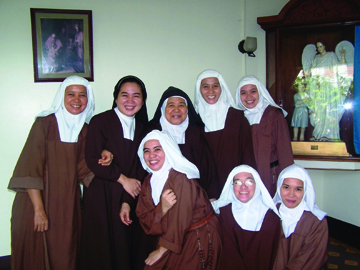
The author, second from left, happy to be home
Waiting for my flight to Cebu, I heard some passengers speaking in my own language, Cebuano, which was music to my ears! Although in Vilvoorde Carmel we Filipina Sisters spoke from time to time in our own language, it was usually mixed with English and Dutch, out of politeness to our Belgian Sisters. The Cebuano-speakers at once included me in their conversation and asked if I had spare religious articles to give them, especially rosaries. I had only a couple of ring rosaries and a keychain with Our Lady of Mt Carmel’s image on it, plus some leaflets. They were so delighted and grateful. Children of a family coming from the Middle East gave me the mano po.
Touch of God
It was nearly take-off time and the seat next to me was unoccupied and I was about to say, ‘Thank God.’ But then a young woman in her twenties, gasping for breath from running, arrived and sat next to me. She was obviously sad and disturbed. She told me about her plight and that of her fellow domestic workers in Shanghai and their eventual escape from the authorities. I just listened and assured her of my prayers. It was heart-rending to see her family photo with three beautiful children and a husband waiting for her. They had no idea what she had been through. Before we parted, I handed her a little amount. At first she hesitated but later accepted and was very grateful. She said that she’d share it with her companions whom she’d meet the following day in Manila to plan their next move. She was a Mormon but I saw her as a sister in need, equally dear to Jesus’ heart.
The time flew so fast that I didn’t notice that we were already about to land in my beloved birthplace, Cebu, the cradle of Christianity in the Philippines where Ferdinand Magellan planted the Cross in 1521.
At the immigration counter I realized that I needed to fill up a form. But a man signalled to me to come after him, got me to fill it up and said, ‘You may go, Sister!’ Another angel from God! While waiting for my luggage, I heard musicians playing outside. Had my sister been serious in telling me that she’d hire a band to meet me? I discovered later that it was meant for some VIPs and not for a poor unworthy Carmelite nun! In the midst of the band’s joyful music, tears of joy were falling down my mother’s and sisters’ cheeks. The family brought me directly to Carmel.
There was a mixture of excitement, tears and joy as Reverend Mother Mary Aimee, my prioress and the current president of the Association of Philippine Carmels, embraced me. After I said ‘so long’ to my family, we went to the refectory, where the Sisters let me talk about my trip. The next three days we were allowed to talk during meals and I answered their many questions about Belgium. The silence God gave me during my long trip was a preparation for these days of much talking. If my sharing wasn’t born out of my communion with God in prayer, I’d be like a ‘noisy gong or clanging cymbals,’ of no benefit to the listener and surely wouldn’t bring glory and honor to God. Like Mary Magdalene, I could only proclaim the Good News after having encountered Jesus very personally and intimately, be it in the Eucharist, in prayer or some other way.
You may contact Sister Carmela at sr.carmela@yahoo.com or carmel_troost@belgacom.net
or write her at Karmelklooster, Troostraat 2, 1800 VILVOORDE, BELGIUM
Treasured Memories Of Africa And South America
By Sr Mary Ignatius C. Aquino OSB
From a history-held mystery Of faces and places past cherished Given in love from the heart of life a bundle of memories am I
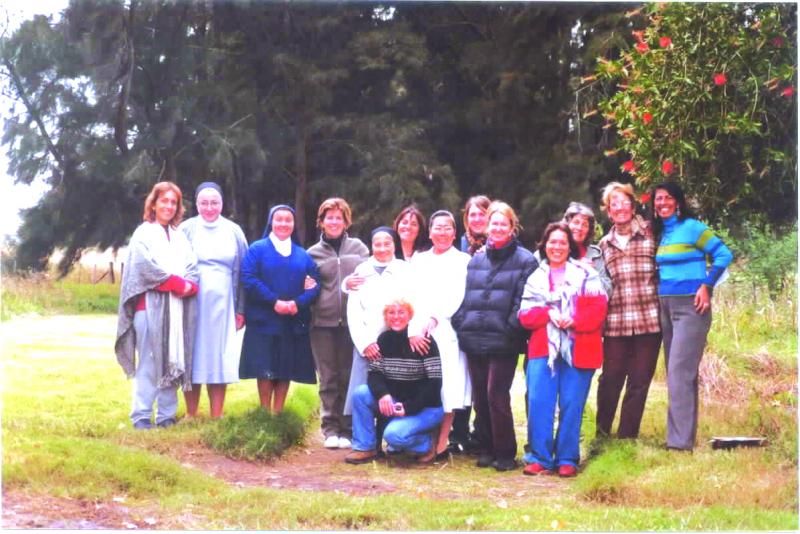
The author (7th from left, standing)
with the 5th group of retreatants in Argentina
Remembering God’s goodness as a foreign missionary in Tanzania, East Africa for seven and a half years and in Los Toldos, Buenos Aires, Argentina, for two years has been a source of transformation for me. Every time I remember the generosity and kindness of the Sisters, friends and all those I’ve served in formation and retreat ministries, I am deeply touched, overwhelmed by their ability to be so loving and challenged to show that kind of goodness myself.
Like our Blessed Mother who treasured and pondered everything in her heart (Luke 2:19), my whole being is filled with awe and wonder for what I’ve seen, tasted, touched and felt in Africa and South America.
Labor of love
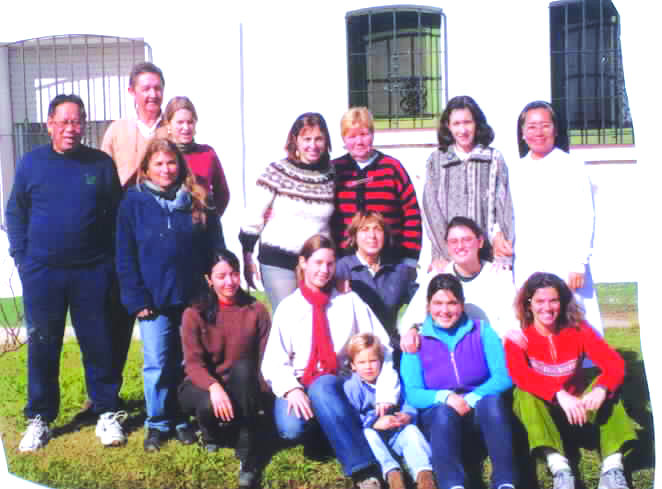
The 18th group of retreatants
It happens once in a lifetime to travel to African countries like Tanzania, Kenya and Namibia. Those safaris from Dar es Salaam to Arusha and then to Uwemba, followed by Peramiho, were real exposures to the life and culture of the people from the north and south of Tanzania. The intensive Kiswahili course at the Danish Center in Arusha was an opportunity to watch a cultural show by the Masai and to go on a safari to Meru National Park. My trips to Nairobi, Kenya, were to attend religious professions and to renew my passport at the Philippine Embassy. The Pan-African Formators’ Meeting in Windhoek, Namibia, was another surprise, traveling through desert country, though a portion of it is rich in natural resources such as semi-precious stones like topaz, amethyst, emerald and quartz. Swakopmund, which is close to the Atlantic Ocean, is like a ‘little Europe’ with its cool winter breeze and classy boutiques. It was a rare privilege to climb one of the sand dunes and enjoy the feeling of being on top of it overlooking Walvis Bay which was filled with thousands of flamingos.
Visiting the families of our formandae – young women preparing for religious life – deeply touched my idealistic nature. The Tanzanians, like us Filipinos, are very hospitable and generous. Every home we visited gave us a very warm welcome, served us the best food and even gave us their fattened chickens as pabaon. Seven years of formation work was indeed a labor of love. To see the gradual transformation of the formandae after their novitiate is amazing and unbelievable. They have become solid monastics as Missionary Benedictine Sisters of Tutzing.
‘La lengua de Dios’
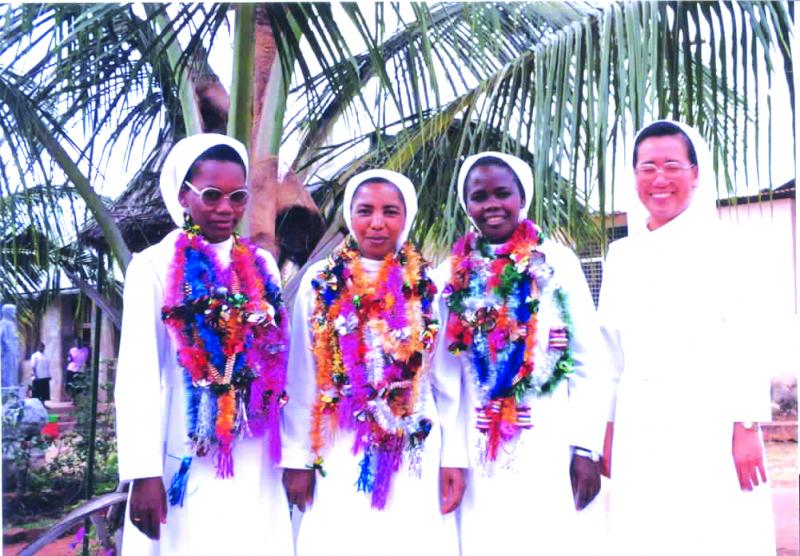
Sr Ignatius extreme right, with the First Tanzanian Sisters of Ndanda Priory
'Español es la lengua de Dios’ - ‘Spanish is the language of God’. This comment by an 84-year-old Argentinian Sister who integrated with us inspired me during my three-month intensive Spanish course in Buenos Aires immediately after my arrival on 25 November 2002. This was a preparation for my retreat ministry in Los Toldos, a two-hour drive from the federal capital. Indeed, I found myself facilitating retreats in Spanish with different groups from all ages and walks of life during weekends. The psycho-spiritual approach was new to the Argentinians who found it to be more effective due to their concrete and experiential encounter with God.
My whole experience as a formator and retreat facilitator brought me closer to my true self as I accompanied the formandae and retreatants in their journey towards God. Everyday was an occasion for celebration, a moment of grace, as we broke bread together and shared our personal and communal experiences in our search. The bonds of love and friendship sustained us and gave us the courage to go on during times of struggle. All these good memories drew us away from depression, doubt and anxiety that turned us around to face some of the joys and blessings that were there mixed in with all the pain.
Surprisingly, I was invited to Sorocaba, Brazil for six weeks to help the two formators prepare for an international formators’ meeting in Germany. This gave me the chance to visit our communities in São Paolo, Cunha and Rio de Janeiro. My morning walks to Botafogo and the nearby beaches like Copacabana, my trips to Corcovado, Pão de Açucar – Sugar Loaf Mountain that overlooks Rio – and Paqueta Island took me to the heights of my travels. I thought Iguazu Falls, partly in Brazil, where they’re known as Cataratas do Iguaçu, and partly in Argentina, where they’re called Cataratas del Iguazú and Niagara Falls were the best of nature that I’d seen but when I saw the whole of Rio de Janeiro, lo and behold . . . it was beyond compare.
Learning from others
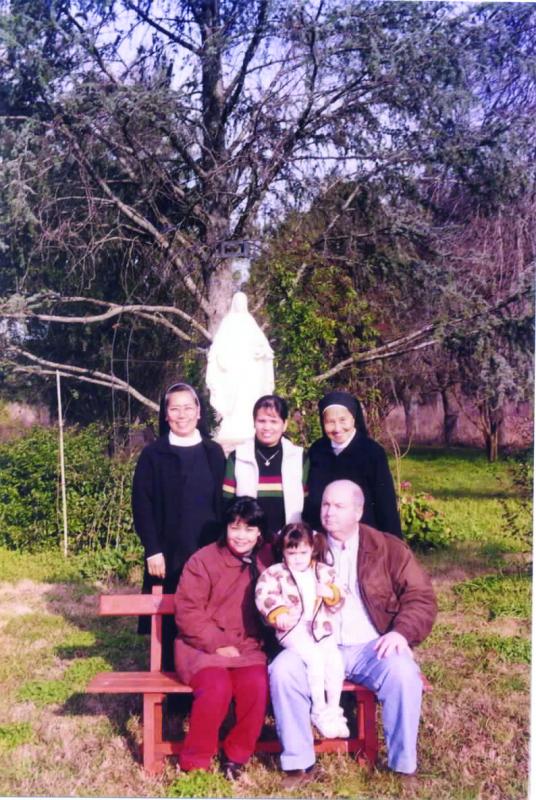
Sr Ignatius, standing left,
with a Filipino-Irish
couple and friends
As I recall these treasured memories, deep within me, I see my life filled with daily miracles fashioning my heart into a vessel of gratitude. I gratefully and lovingly remember few friends and co-sisters who stood with me at the foot of the cross and shared with me the victory of the resurrection. Our fidelity to one another in living our consecration to the full will be a light that will show others the way towards God.
I am in transition, in disenchantment, which is a natural part of endings and new beginnings. The old must be cleared away before the new can grow. One painful experience of disenchantment was when I came to terms with the fact that my religious community is made up of individuals who are just as human as everyone else. What a rude awakening it was when I realized that there were personality clashes, differing views of theology and philosophies of life, power struggles and emotional weaknesses that sometimes forced us apart rather than drew us together. Eventually, I saw that I, too, had many shortcomings that contributed to the flawed condition of the whole. I must simply be patient with the time it takes to recover and to adjust during this re-entry period to the Manila Priory. It is the time to trust my inner wisdom to be wiser and healthier in what I believe to be true about life – that in all things God may be glorified!
You may write
Sr Mary Ignatius Aquino OSB
742-804 Kyoungbuk, Sang-ju Hamchang, Oh-Dong Ri 733-1
South Korea
Wherever I Will Send You, You Shall Go
By Father Thomas M. Priela
 The author is a diocesan priest of the Apostolic Vicariate of Calapan, comprised of the province of Oriental Mindoro. The Society of the Divine Word (SVD) has been working in the island of Mindoro since before World War II.
The author is a diocesan priest of the Apostolic Vicariate of Calapan, comprised of the province of Oriental Mindoro. The Society of the Divine Word (SVD) has been working in the island of Mindoro since before World War II.
The Philippines, being the only major Christian country in Asia, (East Timor’s population of 825,000 is 93 percent Catholic, compared to 83 percent of more than 82,000,000 in the Philippines) has a unique missionary responsibility. John Paul II made a call in this regard. Though these are part of my reasons for becoming a missionary, my motivation is a little more personal. Within living memory we in the Philippines, especially Mindoro, have experienced the benefits of mission work. By a historical accident, the missions to China benefited us greatly.
When I was growing up I kept hearing, often in subdued tones, that this or that missionary then serving in or around Mindoro had been forced to leave China in the early 1950s. I was told that they were waiting for their chance to return. I doubt if any of them did. But I am sure that their waiting immensely helped the Church in Mindoro and the Philippines. Mission areas throughout the country came to be manned by these missionaries. Many reputable Chinese schools were established. Seminaries were endowed and strengthened. In the end, their long provisional stay directly helped the growth of the Philippine Church.
Somehow their work with us has made their waiting ours too. Now that China is beginning to open up, it is payback time – time to resume the unfinished venture.
Why me?
With the thawing of the Cold War, the waiting dulled by frustration became an expectant one. In 1991, when I heard of Filipino missionaries going to Mongolia, the waiting began to feel like an invitation to get involved.
Even then I did not see myself going. I saw my limited social skills as a contraindication of a call to direct mission work. I felt then that my calling was to be an animator and to raise home support. Thus, I tried to float the idea among priests of the Apostolic Vicariate of Calapan (AVC). Many were moved, even up to the level of looking at the challenge under the aspect of responsibility. But none would personally own it. It remained merely a common ecclesial responsibility. After a few years of this I got suspicious that I was deflecting to others a call meant for me. I discerned some more.
In 1994 I applied to go. Bishop Warlito I. Cajandig voiced his support. He even offered to look for openings in China during his ad limina visit to Rome that year. My fallback was Africa. On this I received favorable word from the SVDs of Botswana during my exploratory visit that same year. But neither materialized. The policy was declared that one had to be at least ten years in the ministry before he could be sent on mission work. I only had five years then.
Again I applied to begin preparations in 1996 and looked for openings. That gave me just enough time if I still had to take some studies. This time I relaxed my focus on China and worked also through the Mission Society of the Philippines (MSP). But the priest who was to lead the establishment of our college seminary left and I was asked to take his place. I accepted but asked in return to take the shortest possible preparation to get the job done – Christ the King Seminary graduate studies. It was local and I was already familiar with the people there, factors that would allow my year-long studies to double as a base for securing the needed contacts in the academe and getting work on the college seminary moving. But, in the seven years that followed, the long, heavy work of building up the seminary did not leave any space for mission preparation of any kind. And it was just as well since not a single mission opportunity came my way then (or perhaps I just did not notice).
I thought mission work might not be God’s will for me after all. I pushed the venture out of my mind but somehow the seed had been planted.
Crossroads
The author, extreme right, with other Filipino, Canadian and Chinese teachers in Changchun, Jilin Province
Then, all of a sudden, I was relieved of seminary work! Despite my application in 2005 to begin work on the final phase of the academic program, I was transferred. Just when I was relieved of my seminary duties, two unsolicited offers for mission work came, from friends who were not even really close, within two weeks of each other! I prayed over it, exploring the offers, one for Sweden and the other for China.
The fact that I took as my own the AVC’s mission responsibility and that no one else would go, coupled with this recent series of events, led to my discernment that I must go. I figured that the Holy Spirit would just have to work overtime on my social skills.
Why missions?
I have been asked more than once, ‘Why go when we ourselves are in need of priests?’ In a way, the extent to which this question still has to be answered is a clear indication of how much we need to grow as a Church and how much we need to go into mission work in order to grow. The answer is not so much the Great Commission (Mk 16:15) but the Great Commandment (Mk 12:29-31). Foreign mission is not so much because of the command to evangelize the whole world. After all, there is more than enough evangelizing work to be done close to home. Rather, mission work is based more on the command to love our neighbor as we love ourselves. Thus, while it is true that we are in need, other people are also in similar or even greater need. If we are to respond to their needs as much as we love ourselves, then surely we could not set the ‘me first’ precondition of waiting until we have some surplus to spare.
The question that bothered me more about mission work was that of effectiveness. Certainly, I would be more effective closer to home, where dialogue is easier, than in a foreign culture. Thus, if I were asked where I personally preferred to do my ministry, it would certainly be my home diocese. But then, the ministry is not a question of personal preference or effectiveness. It is a question of God’s call, of allowing oneself to be an instrument in God’s hands, of trying to do good the way God wants it done.
Doing good for a Christian is very different from that of a non-Christian. For a Christian his good works are a continuation of God’s goodness, the Missio Dei – God’s Mission. It is God who does good, who saves and the Christian seeks to cooperate in it. Therefore, a Christian’s efforts to do good must be in accord not only with God’s principles but also with the mode of God’s goodness. In simple terms, the principle is the Great Commandment of Love and the mode is revealed in the way God saved us – the Incarnation (and the Paschal Mystery).
In the mode by which Christ saved, doing good for a Christian is going forth, not waiting around for a summons or an appeal. It is seeking out the needy. Just as the Father sent the Son into the world to save it, just as the Trinity is so because of fully going forth from Itself in love, so does a Christian do good. He goes forth, from his father’s house and from his own land and people if need be. It is not important at all what result he can effect on his own. It is God’s work, not his. His is only to participate, to go where he is sent. Whatever effectiveness there might be is grace – God’s grace.
Why now?
I have long believed that a diocese that does not take its missionary (ad extra) responsibility seriously cannot fully mature. If it actively shirks this responsibility, it would have its own growth stunted and even suffer a setback. Just as a Christian’s love for the other is a key test of the health of his faith life, so also with a diocese.
I go because I am a diocesan priest – because I take as my own the gratitude of my diocese, and of the Philippine Church, for the mission work we have received - because the local Church will not lose but even gain and grow by giving in response to God’s call for the local Church to send.
You may email the author at mpriela@hotmail.com
Your Turn

The authors have since graduated from high school. They mention an article in the July-August 2003 issue, written by Joy Ampiloquio. You may visit www.institucionteresiana.org/asp_en/index.asp for the English-language home page of the website of the Teresian Association, to which Joy Ampiloquio belongs. We are working to have all our back issues available online.
Dear Ate Joy,
May the blessings of the Almighty God give you comfort and happiness with all the smiles in your heart. I really like your article, ‘A Late Life’, in the July-August 2003 issue of Misyon. I’m truly inspired because at an early age you already became a member of an international Catholic lay association. Upon reading your article, I realized that being a missionary is not easy. I learned many things in your article. It’s true that we must give, not ask, and we are to take advantage of every opportunity, every fitting moment, as what you wrote in your article.
I hope that you will continue your mission. I know you can change many lives. I hope that you will write more articles in Misyon. I’ll be waiting for your next article. May God bless you and guide you in doing your mission.
Your new friend, Charmaine
St Catherine’s College, Carcar, CEBU
Dear Miss Joy Ampiloquio,
When I first read your story entitled ‘A Late Life’ in Misyon, I was encouraged to do what you did. I want to form a group and share with them what I learned on how to be close to God. I believe that through this, I can thank God for all the things He has done for me. I do have a question playing in my mind. How can I do this when I’m only fifteen years old? I tried to answer my own question. Maybe, even if I’m still young, I have the ability and knowledge to teach the little youngsters on how to be close to God. In your story, you said that prayer is an important element of your faith and a source of strength. Well, maybe, I can do it too if I have great faith in God.
Thank you for giving me an idea on how to use my time efficiently and giving me inspiration. Even if I don’t know you personally, I know that in our hearts, we are one. I hope you can be my friend. I’ll keep you and your students in my prayers.
Hope to hear from you soon.
Your friend, Fatima Rose
Saint Catherine’s College, Carcar, CEBU
